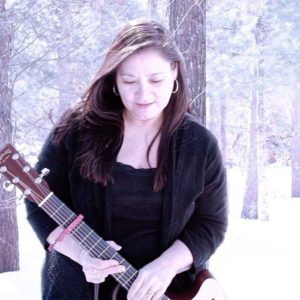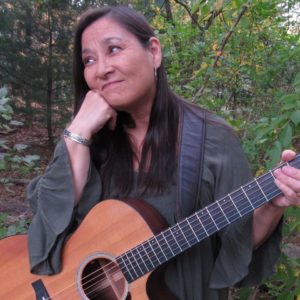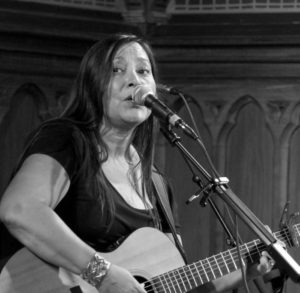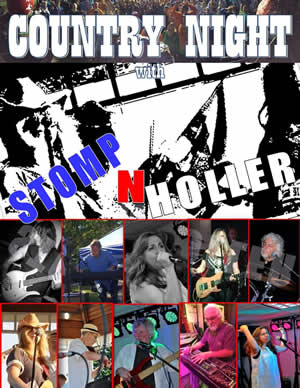
Kim Moberg
Cape Cod singer-songwriter Kim Moberg has spent the last ten years exploring her Native American roots. Moberg hails from the 1,800 year old Tlingit tribe of south eastern Alaska. Growing up Native American came with challenges, like dealing with prejudice.
“Right now, it’s cool to be a Native American. A lot of people are curious in a positive way. But, growing up, no. It wasn’t always very cool, and I did face a lot of prejudice.”
A military brat, attending 10 different schools in 12 years as her father completed his 23 year career in the coast guard, Moberg spent a lot of time being “the new kid.”
“I was made fun of,” Moberg said. “They would make the sounds in the movies the Indians make. There was little interest in finding out and learning about somebody who is different. It was more not being allowed in.”
Moberg’s maternal grandmother grew up one hundred percent in the native culture but colonization happened during her mother’s generation. Moberg was not raised in any native traditions. About 10 years ago that Moberg realized that was kept away from her heritage by design.
“My mother remembers as a young child in school having her mouth taped shut if she spoke in her native language,” Moberg said.
Thanks to Alaska Naive Claims Settlement Act singed into law by President Richard Nixon in 1971, educational services allow descendents of Native American tribes to learn more about where they came from. The tribal elders came up with a sustainable benefit for the people for Alaska instead of merely handing out a one time cash distribution. The act lead to the creation of an organization, Sealaska Corporation, and it issued stock to qualifying Native Americans. An offshoot of that corporation is the Sealaska Heritage Institute.
“It’s goal is to bring back a lot of the native culture that was almost lost,” Moberg said. “Tlingit was not a written language. It was a spoken language. My great uncle had a hand in writing the very first Tlingit to English dictionary. He was a poet laureate and a linguist.”
Moberg’s research lead to her discovering more realistic details than what she might find on popular television shows and in motion pictures. Her aunt wrote a series of books based on interviews with countless numbers of people to document their stories and their legends that had not previous been recorded.

Kim Moberg
“That, “ Moberg said, “is one of the resources. Sealaska Heritage Institute has a number of different offerings for people to become more educated about their culture..”
Moberg does not, on the surface, see a connection between being a Native American and becoming a musician. Yet, arts, music, singing, songwriting, and dance are very prominent part of her Tlingit culture. “Just like other cultures, it’s been passed down and just part of your DNA,” the singer-songwriter said. “My mother was a classical pianist for all of her life. We grew up with music in the house all the time, and she was very diverse in her taste.”
Moberg grew up with not only classical but also with David Bowie, and jazz, and her father’s country western collection, including a lot of Johnny Cash.
Moberg took guitar lessons from her mother for one year. Her mother was a classical pianist who taught herself how to play guitar so she could make extra money teaching guitar lessons. It was Moberg’s job to type up lyrics sheets for her students, a way of paying for her own lessons. From there, Moberg was self-taught.
“My grandmother played guitar and was a dancer,” Moberg said. “Her brothers played guitar.”
Moberg’s latest CD Up Around The Bend features a Moberg original titled “The Raven” which she based on an ancient legend from her culture.
“There is a legend that been passed down verbally from generation to generation called How The Raven Stole The Sung,” the singer-songwriter said. “It tells the story of how a very greedy chief stole the light of the world from humanity to keep it for himself and how the Raven transformed himself in order to steal the sun back from the greedy chief and bring it back to humanity.” The tale has been turned into a children’s book 3o years ago, but, for Moberg, there needed to be a song.
“To my knowledge, there is not a folk song about it” she said. “I just wanted to share that story with people through song.”
Moberg’s “The Raven” plays over a beat strongly reminiscent of Native American style drumming. “It was intentional because in the Tlingit culture drums are a very prominent instrument,” she said.
“The Raven song showcases two bird characters, a raven and an eagle, a cedar tree, stream, water , elements that often show up in Native American writing. “Many Native American tribes are very connected to nature,” she said. “The raven and the eagle are the two moieties of the Tlingit tribe. I am of the raven moiety.”

Kim Moberg
On Moberg’s’ previous CD, Above Ground, she recorded a song she titled “Be The Light.” It is not specifically a Native American song, though it does comment on the Native American version of the soul. “We grew up not so much with organized religion,” the singer-songwriter said, but very spiritual and ‘Be The Light’ comes from a place like that.”
On Moberg’s Facebook page this month [November 2020] she posted a photo of Native American Heritage Month at Saxman Village Totem Park at Ketchikan, Alaska. It is a stop she made on her return trip from Juneau 11 years ago with family, which is where she took the picture.
Exploring her Native American culture, through research and songwriting, has Moberg’s life more three dimensional. “For a long time, because of the way I look, one of the first questions people would always ask me is what is my nationality,” she said. “Because of colonization and because I didn’t grew up in the Native ways, I wasn’t knowledgeable about it. I was always insecure about my heritage. I didn’t feel like a really good Indian. Discovering that was actually by design, and it was an epiphany, and it was empowering. It made me want to dig into my culture a little deeper and too educate our daughters a little more about it.”
While Hollywood has been showcasing fictionalized characters with Native American nicknames like Dances With Wolves, Stands With A Fist, Running Bear, and so forth, there are actual tribal given names.
“In the Tlingit culture names are typically assigned by the oldest maternal family member. That was my grandmother,” she said. “I come from a family of four girls, and my grandmother gave us each our names. The tradition is she gave a child a name of someone who’s passed on to keep their spirit alive. She named me after her sister, her younger sister, who had passed away when she was very young. I don’t know the exact spelling but it’s pronounced ‘Kushka.’ It roughly means someone who sits very still and shines brightly.”
Moberg didn’t feel connected to her Native name until she was older. “I knew those words my whole life, but it didn’t click with me until I became a songwriter and getting my songs out there, performing and connecting with people through music. It was almost prophetic.”
The rest of Moberg’s new album Up Around The Bend was inspired by many life experiences, a walk around Wellesley College, loss, the soldiers who guard the tomb of the unknown soldier, losing her sister to breast cancer, her mother, during tough times, offering words of encouragement,
Her song “Right To Bear Arms” is clearly based on the Newtown, Connecticut school shooting. Yet, it is not pointed at any one individual or any one organization or mental illness. “I think we, as a society, all together, can do a better job about military weapons being sold to civilians, about being more empathetic, identifying mental illness earlier, and helping people who need it. I think we just don’t spend enough attention to all of those areas, and that’s a combination that leads to that kind of violence.”

Heather Swanson, Kim Moberg
Supporting her voice and her acoustic guitar work are her producer Jon Evans on bass and several other instrument and Mattias Bossi on drums and percussion supporting her acoustic guitar and vocals. Jon Evans owns a studio called Brick Hill in Orleans, Massachusetts on Cape Cod. Moberg describes him as a phenomenal musician, recording engineer, and producer.
“He’s toured with Tori Amos for nine years. He’s worked with Elton John,” Moberg said. “Mattias Bossi and Jon are good friends so that’s how Matthias got on this CD because Jon brought him in.”
Fiddle player Heather Swanson who, appears on three tracks on the new CD, is a musician Moberg befriended after working with her at the Annual Sandwich Porchfest. Prior to the current pandemic, the paired often played out as a duo. “She’s an incredibly talented musician, classically trained. Her love lies with Celtic music. She’s a master at improvisation,” Moberg said.
Moberg’s future plans is to play out more once the world comes back to life. Her recent series of virtual concerts, in addition to teaching her a new live streaming skill set, has allowed her music to be heard at venues in Tucson, Arizona, Chicago Illinois, and a jazz fest on the radio. “Laying the groundwork,” Moberg said. “Just laying the ground work.”
For more information about Kim Moberg:

